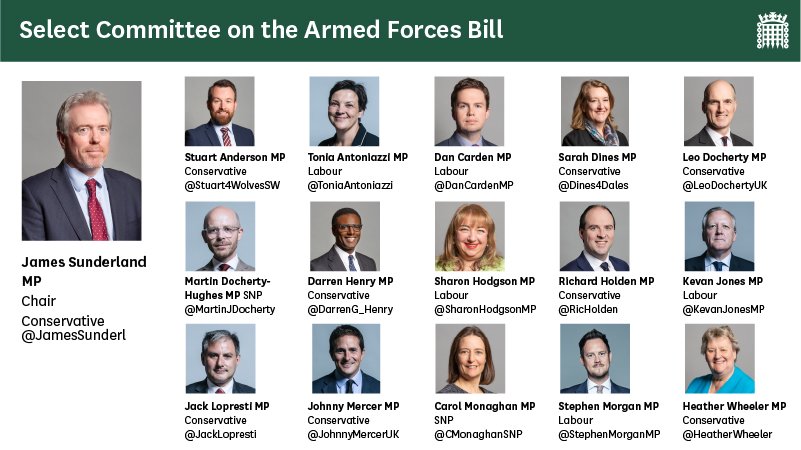
Today, the House of Commons launches the Select Committee on the Armed Forces Bill, chaired by James Sunderland MP. The Select Committee on the Armed Forces Bill 2021 has held its first meeting to agree its programme of scrutiny on the Armed Forces Bill 2019-21.
The Select Committee on the Armed Forces Bill 2021 may go through the Bill formally, clause by clause, and make amendments, it may also take formal oral and written evidence and make visits. As well as reporting the Bill to the House the select committee may make a Special Report to the House of its findings and recommendations. While this is a select committee, which functions largely under usual select committee procedure, it can also meet and function like a public bill committee.
The Committee welcomes written evidence submission on all the provisions within the Bill as well as any notable omissions and additionally on the state of Armed Forces pay. In particular, the Committee has called for evidence submissions in response to the following questions and on the following topics:
Armed Forces Covenant
- Is the ‘duty to have due regard’ the appropriate mechanism to further incorporate the Armed Forces Covenant into law? What alternative mechanisms could be used?
- Is the focus on healthcare, education, and housing matters appropriate? Could this have a detrimental impact on other areas of the Armed Forces Covenant?
- Are the specified persons and bodies proscribed in the Bill sufficient or should these be expanded?
- An assessment of the Bill’s application to Scotland, Wales, and Northern Ireland in respect of the Armed Forces Covenant and the Secretary of State’s duty to consult the devolved administrations.
- An assessment of the power of the Secretary of State to issue guidance on the duties imposed by the Bill.
- An assessment of the power of the Secretary of State to make regulations to widen the duties in the Bill by specifying additional persons or bodies to be subject to those duties and to specify additional functions (areas other than healthcare, housing and education) in which the duty may apply.
- An assessment of the enforcement of the ‘duty to have due regard’ and the impact on enforcement bodies such as relevant Ombudsmen.
- What are the resource implications of these measures and how will success be measured?
- Whether the provisions impact differently on Serving personnel (both Regulars and Reservists), veterans, and their families?
Service Justice System Reforms
- What will be the impact of the changes to the constitution of Court Martial boards? Do these reforms go far enough, or should further changes be considered?
- How far does the Bill address concerns about the handling of serious crimes committed by service personnel in the UK?
- Will the duty to agree a new protocol on prosecution of the most serious crimes where there is concurrent jurisdiction ensure that the most appropriate route to justice is taken in these cases? Should there be an explicit protocol covering investigations as well as prosecutions?
- Will the plans for independent oversight of the service police provide effective access to redress, and improve confidence that complaints will be handled fairly?
- What lessons should be learned from the establishment of the Independent Office for Police Conduct and its predecessor the Independent Police Complaints Commission in establishing the new office of Service Police Complaints Commissioner?
- Do the changes to the service complaint appeals process strike the right balance between ensuring fair access to appeals and ensuring complaints are handled efficiently, and are there enough safeguards in place to ensure those who cannot meet the new time limits get fair treatment?
The Committee reminds witnesses that it has resolved not consider individual cases.
Evidence submissions will be accepted until midday on Sunday 21 March and earlier submissions are likely to be referenced during the Committee’s oral evidence proceedings.
Chair of the Committee on the Armed Forces Bill, James Sunderland, said:
“I am delighted to be chairing the Select Committee on the Armed Forces Bill, which will undertake the important job of scrutinising the Armed Forces Bill, as well as providing an opportunity for Parliament to take a broader look at the some of the issues our Armed Forces face.
“The Committee will work intensively, within the space of a couple of months, to explore not only the Bill itself, but also the current imperatives facing our Armed Forces, such as the efficacy of support available for service personnel, veterans and families as well as the structures in place that both safeguard and ensure accountability.
“I look forward to working with colleagues, in Parliament and Government, on this unique select committee.”
